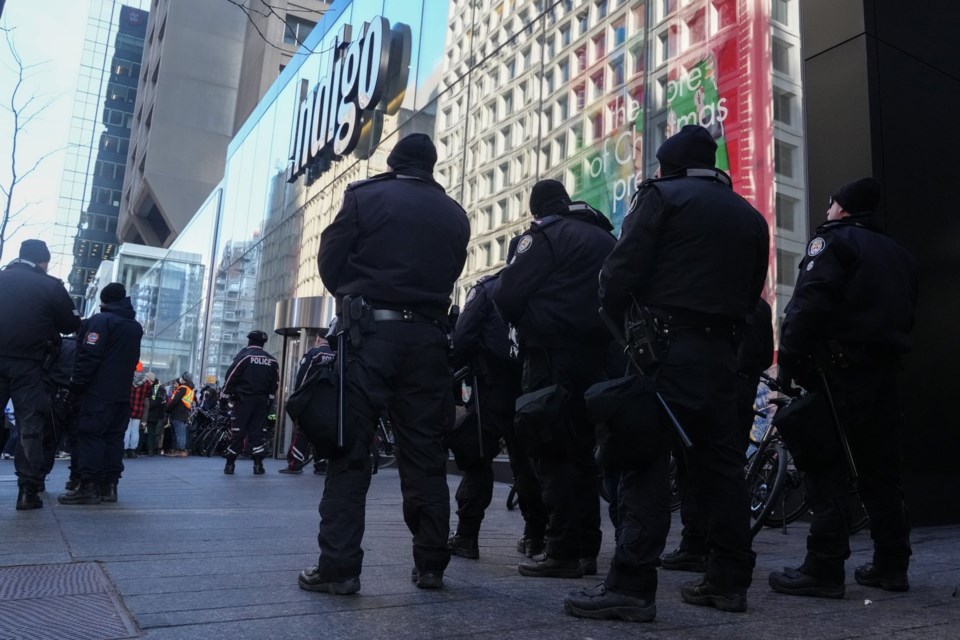TORONTO — Charges were dropped against four of the 11 people accused of defacing a Toronto Indigo bookstore in a case that has become a flashpoint over how police respond to pro-Palestinian protests.
Karl Gardner, one of the four, called the development a small, but "bittersweet", victory.
"I expected to feel relieved, but I didn't," said Gardner, a Toronto-based educator and activist. "I feel angry that the police continue to charge activists in attempt to silence Palestinian solidarity activists. And I feel proud that this hasn't succeeded."
Toronto police laid charges of mischief, conspiracy and criminal harassment after the group allegedly splashed red paint and postered the downtown store in what they described as "suspected hate-motivated offences".
Indigo founder and chief executive Heather Reisman, who is Jewish, has long been a target of protests over a foundation she started with her husband that offers scholarships to people with no family ties in Israel who served in the army.
Pro-Palestinian groups, including Jews Say No to Genocide, accused the police and others of mischaracterizing the protest as "hate-motivated" and coming down hard on protesters in an alleged effort to silence and discredit Palestinian solidarity actions.
"It's absurd that people are facing these charges for the alleged act of simply putting up posters and washable paint. You know, if we're outraged about violence then why aren't we more focused on what's unfolding in Gaza right now," said Gardner, a political scientist, and formerly a post-doctoral fellow at the University of Toronto and sessional lecturer at the University of Waterloo.
The Friends of Simon Wiesenthal Center, and other pro-Israel groups, denounced the Indigo protests as antisemitic, allegations forcefully denied by protesters, who say it was intended to draw attention to the foundation's military ties.
The United Nations’ highest court, the International Court of Justice, is investigating whether Israel has committed genocide during its seven-month war against Hamas in Gaza, allegations Israel has strenuously denied.
Israel's offensive, in response to the deadly Hamas-led Oct. 7 assault, has killed more than 35,000 Palestinians, according to Gaza's Health Ministry, spurring a humanitarian crisis and near-famine.
In a statement issued through Toronto police on Wednesday, Crown prosecutors said there was no reasonable prospect for conviction against the four. It called the case a "complex prosecution" involving an "immense volume of evidence including surveillance, body worn camera, and several cellphone extractions."
"This decision should not be seen as a criticism of the police determination that there were reasonable grounds for the arrests of these four individuals," the statement read. "However, the standard for proceeding with a prosecution is properly higher and more rigorous."
Groups who backed the activists have also accused police of carrying out simultaneous early morning raids on the accused.
They claim police in some cases did not identify themselves before bursting into homes, leaving broken doors behind. They also allege family members, including some elderly, were handcuffed, sometimes in view of their neighbours or in view of young children.
Gardner said that in his case, police broke down the door at a house where he had not lived in for four years. When he learned what had happened, Gardner said he turned himself into police.
In a statement, a police spokesperson said officers carried out judicially authorized search warrants as part of the investigation in November.
"Entry plans when conducting a search warrant are based on the specific circumstances of the investigation and are carried out in accordance with the terms of the warrant," spokesperson Stephanie Sayer said in a written statement.
"The Toronto Police Service will persist in enforcing hate crime laws and laying charges when justified, ensuring the safety and security of our communities."
Gardner said, along with supporting the other seven accused, he will now look to "regain a semblance of normalcy after the police ripped that away from me." After his arrest, he said he was placed on administrative leave from both his university jobs and those contracts were left to expire.
"The impacts don't just start and stop with the arrest, nor do they start and stop with the charges being withdrawn. This has had severe impacts on my life, on my reputation, on my livelihood and my career, and as well as my mental health and well-being."
This report by The Canadian Press was first published May 22, 2024.
The Canadian Press




